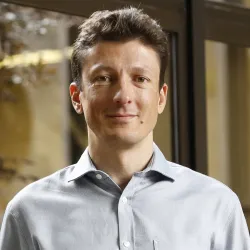Unlocking cutting edge innovations for central banks: The key to data and emerging technologies
Data Q4 2024
Unlocking cutting edge innovations for central banks: The key to data and emerging technologies
Date: November 18-20
Time: 8:00am-11am (EDT) | 1pm-4pm (GMT) | 2pm-5pm (CET) | 9pm-12am (SGT)
Location: Virtual
At the conclusion of the training, participants will be able to:
- Delegates will develop the skills to critically consider and tactically introduce technological innovations to their institutions
- Enhance their ability to collect and analyse data using machine learning to improve and inform economic outlooks and regulatory decisions
- Prepare delegates for the emergence of quantum computing and how this technology can be used to benefit their central bank
- Identify potential economic outcomes from the adoption of innovations, and the current methods utilised to regulate them
- Familiarise delegates with APIs, DLTs, and the possibilities of open finance between institutions, and contemplate their implications.
Chair

Maryam Haghighi
Director of enterprise data science and insights
Bank of Canada
Maryam Haghighi is the Director of Data Science at the Bank of Canada, where she provides strategic leadership for data science, including artificial intelligence and machine learning, in support of Canada’s central bank’s mandate.
She has successfully led diverse teams, from academic environments to global enterprises and private partnerships, to solve complex data problems for multi-billion-dollar projects on the ground and in the skies.
Prior to joining the Bank, she pioneered the first ever space-based data analytics system of a new satellite constellation. As Canada’s delegate to international panels under the United Nations, she provided data and modelling expertise for the global aviation risk management.
Previously, she successfully applied her expertise to a diverse range of projects within the Government of Canada, in health care and in not-for-profits.
She holds a doctorate in Mathematics and a Master of Science in Applied Mathematics from the University of Ottawa. She was a professor of mathematics and computer science courses and has been a technical consultant in patent processes. She has a deep passion for interdisciplinary work as well as supporting women in technology initiatives.
Speakers

Marina M. Tavares
Senior economist
IMF
Marina M. Tavares is a senior economist in the Climate Change Structural Reforms Division of the IMF’s Research Department. Before joining RES, Marina led the working group on the interconnections between macroeconomic policy and inequality under FCDO-IMF Collaboration. Her research interests include macroeconomics, labor markets, AI, climate change, gender, and inequality. Before joining the Fund, Ms. Tavares worked as an assistant professor at Instituto Tecnologico Autonomo de Mexico (ITAM), and she holds a Ph.D. in Economics from the University of Minnesota.

Miguel Diaz
Deputy head, BIS innovation hub
BIS
Miguel is the Deputy Head of the BIS Innovation Hub (BISIH) and Head of Strategy. Prior to that he was Head of the Toronto Innovation Hub Centre within the BISIH , in both roles he has contributed to the creation of digital financial public goods such as settlement systems, identity solutions and open finance environments. Before this position he was the head of Payment Systems and Financial Market infrastructures at the central Bank of Mexico where he guided the development, operation, analysis, and regulation of financial market infrastructures. He oversaw the modernization of the payment systems in Mexico, directed the creation of a fast payment system denominated in dollars, and was deeply involved in the development of the operational and regulatory strategy of the Central Bank regarding financial market infrastructures, including CBDC and the inclusion of new market participants in the ecosystem and the opening of the market to open finance solutions. In his previous roles he directed strategic planning and managed macro-financial analysis for the Bank of Mexico, and he is an Economist with a Ph.D. from the University of Chicago.

Joan Paredes
Principal economist, prices and costs division
European Central Bank
Joan Paredes is a Principal Economist in the Prices and Costs Division of the European Central Bank (ECB). He received a Ph.D. in Economics from the Goethe University Frankfurt. His research interests cover in general macroeconomics and more specifically, empirical macroeconomics. His papers have been published in international academic journals including Journal of Applied Econometrics, International Journal of Forecasting and the Scandinavian Journal of Economics, amongst others.

Giuseppe Bruno
Director, IT support for economics and statistics
Bank of Italy
Giuseppe Bruno joined the Bank of Italy in 1989 and was assigned to the Econometrics Office of the Economic Research Department, where he was responsible for developing procedures for database management and for the estimation and simulation of the Bank's quarterly econometric model. In this capacity, he worked with experts from the Federal Reserve's Division of Research and Statistics and from other leading research institutes. In 1993 he spent an academic year at the University of Pennsylvania (Philadelphia) for developing algorithms for optimal control of econometric models.
In 2000, after a short period at the statistical Division of OECD, he was appointed Head of the Economic Research Department's IT unit, in charge of coordinating projects for the introduction of new ICT platforms for economic and statistical applications. In 2016 he was given the responsibility of coordinating a multidisciplinary team on Big Data which works across Departments with different skills (economists, statisticians, computer scientists). One of the team’s goal was to build a HW/SW infrastructure capable to deal with different kinds of Big Data related to macroeconomic and microeconomic issues. The implementation of high speed access data lake hosting data from social media and news aggregator along with structured data provides a test bed for different machine learning applications.
Over his career he has published over 25 papers in different economic and computational economics journals.

Ajit Desai
Principal data scientist
Bank of Canada
Ajit Desai is a principal data scientist in the research division of the Bank of Canada's Banking and Payments Department. His current work leverages cutting edge techniques such as artificial intelligence, machine learning, and quantum computing to study payments data (including cryptocurrency data) with the primary objective of making Canada’s digital payments infrastructure safe and efficient. Dr. Desai received his Ph.D. from Carleton University in 2018 in Computational Science and Engineering and M.S. from Indian Institute of Technology Madras in 2011 in Aerospace Engineering.

Melchor T. Plabasan (Mhel)
Senior director, technology risks and innovation supervision department
Bangko Sentral ng Pilipinas
Mhel is the Department Head of Technology Risk and Innovation Supervision Department of the Bangko Sentral ng Pilipinas. His progressive leadership has reshaped the Bangko Sentral’s regulatory approach on technology and innovation resulting in financial services that make the day-to-day lives of Filipinos better and easier. Through Mhel’s leadership in his role in the Bangko Sentral, innovative services like electronic wallets, online banking services, or digital banks, were made available to the banking public. Nowadays, Mhel is yet again at the forefront of regulatory advancements aimed at leveraging on innovative technologies and strategic partnerships to improve the lives of every Filipino. These include regulatory sandbox, supervisory technology, and secure open data access or open finance, among others.

Douglas Kiarelly Godoy de Araujo
Economist, monetary and economic department
BIS International Data Hub
Douglas Araujo joined the BIS in September 2018, where he has been an economist since May 2022. Previously, Douglas was in the Secretariat of the Basel Committee on Banking Supervision overseeing a range of policy and supervisory topics. Before that, he worked at the Central Bank of Brazil on macroprudential supervision (2011-15) and led the efforts to develop and implement the Brazilian proportionality framework for prudential regulation (2015-18). Douglas worked on financial stability monitoring as a Fellow at the BIS's Financial Stability Institute in 2014. From 2015 to 2018, he also supported a number of countries in enhancing their macroprudential frameworks as a member of International Monetary Fund missions. Until 2011, Douglas worked in the private sector in Brazilian financial markets. His current research focuses on banking and the effects of digitisation on finance. Douglas also contributes open source software at the intersection of machine learning and economics.

Alessandro Fraga
Financial market infrastructures specialist
Banco Central do Brasil
With over 25 years of experience, Alessandro has dedicated 13 years of his career to the Central Bank of Brazil. At the Central Bank, he has specialized in Financial Market Infrastructures, covering areas such as financial risk, supervision, authorization, and regulation. As an advocate for innovation, Alessandro actively contributes to the Central Bank’s CBDC project. He holds a degree in Electrical Engineering from the University of Brasília (UnB).
Agenda
13:00 – 13:15
Chair’s opening remarks
13:00 - 13:15
- Introduce themselves and the key learning outcomes to the delegates
- Provide an overview of the course
- Encourage delegates to keep their cameras on and ask questions
Maryam Haghighi is the Director of Data Science at the Bank of Canada, where she provides strategic leadership for data science, including artificial intelligence and machine learning, in support of Canada’s central bank’s mandate.
She has successfully led diverse teams, from academic environments to global enterprises and private partnerships, to solve complex data problems for multi-billion-dollar projects on the ground and in the skies.
Prior to joining the Bank, she pioneered the first ever space-based data analytics system of a new satellite constellation. As Canada’s delegate to international panels under the United Nations, she provided data and modelling expertise for the global aviation risk management.
Previously, she successfully applied her expertise to a diverse range of projects within the Government of Canada, in health care and in not-for-profits.
She holds a doctorate in Mathematics and a Master of Science in Applied Mathematics from the University of Ottawa. She was a professor of mathematics and computer science courses and has been a technical consultant in patent processes. She has a deep passion for interdisciplinary work as well as supporting women in technology initiatives.
13:15 – 14:15
Decrypting the liquidity dilemma in HVPS: A case study on improving efficiency with quantum algorithms for payment ordering
13:15 - 14:15
- Provide an overview of quantum computing, and how it has become a topic of interests for central banks.
- Explore the Bank of Canada’s new payment’s project, which uses quantum in their HVPS to navigate liquidity and optimise the order of payments, preventing delays.
- Investigate the implications this project has on the future of payments and the potential of quantum as the technology develops in the future.
Ajit Desai is a principal data scientist in the research division of the Bank of Canada's Banking and Payments Department. His current work leverages cutting edge techniques such as artificial intelligence, machine learning, and quantum computing to study payments data (including cryptocurrency data) with the primary objective of making Canada’s digital payments infrastructure safe and efficient. Dr. Desai received his Ph.D. from Carleton University in 2018 in Computational Science and Engineering and M.S. from Indian Institute of Technology Madras in 2011 in Aerospace Engineering.
14:15 – 15:00
Case study: Using machine learning models to create economic forecasts
14:00 - 14:45
- Discuss the importance of using accurate, real-time data for artificial intelligence to make predictions
- Evaluate how central banks are using AI to predict inflation rates and make monetary policy decisions
- How can using machine learning models for economic forecasts eliminate human error in policy?
- Discuss if the benefits of using AI this way is greater than any ethical or cybersecurity concerns
Joan Paredes is a Principal Economist in the Prices and Costs Division of the European Central Bank (ECB). He received a Ph.D. in Economics from the Goethe University Frankfurt. His research interests cover in general macroeconomics and more specifically, empirical macroeconomics. His papers have been published in international academic journals including Journal of Applied Econometrics, International Journal of Forecasting and the Scandinavian Journal of Economics, amongst others.
15:00 – 15:15
Coffee break
15:00 - 15:15
15:15 – 16:00
Preparing central banks for machine learning’s emerging influence on economic output and inflation
15:00 - 16:00
- Discuss how automating tasks is impacting the productivity of the current economy
- Will these new technologies impact economic inequality?
- How is artificial intelligence expected to influence workers in the next 5-10 years?
- Evaluate the proposed inflationary and disinflationary effects of automating tasks and machine learning
Marina M. Tavares is a senior economist in the Climate Change Structural Reforms Division of the IMF’s Research Department. Before joining RES, Marina led the working group on the interconnections between macroeconomic policy and inequality under FCDO-IMF Collaboration. Her research interests include macroeconomics, labor markets, AI, climate change, gender, and inequality. Before joining the Fund, Ms. Tavares worked as an assistant professor at Instituto Tecnologico Autonomo de Mexico (ITAM), and she holds a Ph.D. in Economics from the University of Minnesota.
13:00 – 14:00
Artificial intelligence for central banking: An overview of machine learning and other AI applications
13:15 - 14:15
- An overview of machine learning, and how it can and has been implemented in different departments within a central bank (I.E. AML/CFT, climate predictions, economic predictions)
- How to Identify areas within a central bank where AI can be useful, and how to introduce it with a central bank’s infrastructure
- How to identify what model of AI will be suitable for different projects
- What challenges has AI presented for central banks so far?
Douglas Kiarelly Godoy de Araujo
Economist, monetary and economic department
BIS International Data Hub
Douglas Araujo joined the BIS in September 2018, where he has been an economist since May 2022. Previously, Douglas was in the Secretariat of the Basel Committee on Banking Supervision overseeing a range of policy and supervisory topics. Before that, he worked at the Central Bank of Brazil on macroprudential supervision (2011-15) and led the efforts to develop and implement the Brazilian proportionality framework for prudential regulation (2015-18). Douglas worked on financial stability monitoring as a Fellow at the BIS's Financial Stability Institute in 2014. From 2015 to 2018, he also supported a number of countries in enhancing their macroprudential frameworks as a member of International Monetary Fund missions. Until 2011, Douglas worked in the private sector in Brazilian financial markets. His current research focuses on banking and the effects of digitisation on finance. Douglas also contributes open source software at the intersection of machine learning and economics.
14:00 – 14:45
The possibilities of open finance: The benefits of APIs, data sharing and the potential risks of interconnectivity
13:00 - 14:00
- Overview of open banking, open finance, and open data and how central banks are broaching this new stage of data sharing
- Evaluate the current state of open finance regulation, and ask how will open finance influence financial stability?
- How does data sharing coincide with data privacy and protection, what are the current risks of data scraping?
Miguel is the Deputy Head of the BIS Innovation Hub (BISIH) and Head of Strategy. Prior to that he was Head of the Toronto Innovation Hub Centre within the BISIH , in both roles he has contributed to the creation of digital financial public goods such as settlement systems, identity solutions and open finance environments. Before this position he was the head of Payment Systems and Financial Market infrastructures at the central Bank of Mexico where he guided the development, operation, analysis, and regulation of financial market infrastructures. He oversaw the modernization of the payment systems in Mexico, directed the creation of a fast payment system denominated in dollars, and was deeply involved in the development of the operational and regulatory strategy of the Central Bank regarding financial market infrastructures, including CBDC and the inclusion of new market participants in the ecosystem and the opening of the market to open finance solutions. In his previous roles he directed strategic planning and managed macro-financial analysis for the Bank of Mexico, and he is an Economist with a Ph.D. from the University of Chicago.
14:45 – 15:00
Coffee break
14:45 - 15:00
15:00 – 16:00
Chair lead working group
15:00 - 15:45
- The chair provides a brief overview of what the course
- The chair presents the delegates with topics
- Delegates engage with discussions based on what they have learned
- Delegates create action plan
Maryam Haghighi is the Director of Data Science at the Bank of Canada, where she provides strategic leadership for data science, including artificial intelligence and machine learning, in support of Canada’s central bank’s mandate.
She has successfully led diverse teams, from academic environments to global enterprises and private partnerships, to solve complex data problems for multi-billion-dollar projects on the ground and in the skies.
Prior to joining the Bank, she pioneered the first ever space-based data analytics system of a new satellite constellation. As Canada’s delegate to international panels under the United Nations, she provided data and modelling expertise for the global aviation risk management.
Previously, she successfully applied her expertise to a diverse range of projects within the Government of Canada, in health care and in not-for-profits.
She holds a doctorate in Mathematics and a Master of Science in Applied Mathematics from the University of Ottawa. She was a professor of mathematics and computer science courses and has been a technical consultant in patent processes. She has a deep passion for interdisciplinary work as well as supporting women in technology initiatives.
13:00 – 14:00
Harnessing generative AI: Which options are available for a safe and cheap adoption?
14:15 - 15:00
- Review of Generative AI and how to introduce it into a central bank's infrastructure
- What is the endgame of AI regulations?
- Will GPTs pose the risk of pro-cyclicality?
- Evaluate the role central banks will play in regulating this technology
- What efforts can be put forth to build familiarity with new technologies and AI literacy?
Giuseppe Bruno joined the Bank of Italy in 1989 and was assigned to the Econometrics Office of the Economic Research Department, where he was responsible for developing procedures for database management and for the estimation and simulation of the Bank's quarterly econometric model. In this capacity, he worked with experts from the Federal Reserve's Division of Research and Statistics and from other leading research institutes. In 1993 he spent an academic year at the University of Pennsylvania (Philadelphia) for developing algorithms for optimal control of econometric models.
In 2000, after a short period at the statistical Division of OECD, he was appointed Head of the Economic Research Department's IT unit, in charge of coordinating projects for the introduction of new ICT platforms for economic and statistical applications. In 2016 he was given the responsibility of coordinating a multidisciplinary team on Big Data which works across Departments with different skills (economists, statisticians, computer scientists). One of the team’s goal was to build a HW/SW infrastructure capable to deal with different kinds of Big Data related to macroeconomic and microeconomic issues. The implementation of high speed access data lake hosting data from social media and news aggregator along with structured data provides a test bed for different machine learning applications.
Over his career he has published over 25 papers in different economic and computational economics journals.
14:00 – 14:15
Coffee break
14:00 - 14:15
14:15 – 15:00
Cloud computing: Using offsite data storage to increase infrastructure and encourage data sharing
13:00 - 14:00
- Case study with a general overview of using cloud computing to support a central bank in places with less infrastructure
- Benefits of having shared data in a central bank with examples
- Evaluate how to protect data while incorporating cloud computing
- Weigh differences of onsite vs offsite data storage risks
Melchor T. Plabasan (Mhel)
Senior director, technology risks and innovation supervision department
Bangko Sentral ng Pilipinas
Mhel is the Department Head of Technology Risk and Innovation Supervision Department of the Bangko Sentral ng Pilipinas. His progressive leadership has reshaped the Bangko Sentral’s regulatory approach on technology and innovation resulting in financial services that make the day-to-day lives of Filipinos better and easier. Through Mhel’s leadership in his role in the Bangko Sentral, innovative services like electronic wallets, online banking services, or digital banks, were made available to the banking public. Nowadays, Mhel is yet again at the forefront of regulatory advancements aimed at leveraging on innovative technologies and strategic partnerships to improve the lives of every Filipino. These include regulatory sandbox, supervisory technology, and secure open data access or open finance, among others.
15:00 – 15:45
Explore distributed ledger technologies (DLTs) with Banco Central do Brasil’s project Drex
14:15 - 15:00
- Explore the comparison between traditional and digital finance and uncover the potential of Distributed Ledger Technologies (DLTs) in central bank digital currencies through the Drex pilot program.
- How can central banks bridge decentralized finance (DeFi) with traditional financial systems?
- How has the central bank leveraged blockchain technology to enhance secure digital payments?
- What advancements has the bank made in integrating artificial intelligence into the Drex app?
With over 25 years of experience, Alessandro has dedicated 13 years of his career to the Central Bank of Brazil. At the Central Bank, he has specialized in Financial Market Infrastructures, covering areas such as financial risk, supervision, authorization, and regulation. As an advocate for innovation, Alessandro actively contributes to the Central Bank’s CBDC project. He holds a degree in Electrical Engineering from the University of Brasília (UnB).
15:45 – 16:00
Chair closing remarks
15:45 - 16:00
- The chair closes out the course with what they have learned
- provides feedback on discussions brought up by delegate over the course
Maryam Haghighi is the Director of Data Science at the Bank of Canada, where she provides strategic leadership for data science, including artificial intelligence and machine learning, in support of Canada’s central bank’s mandate.
She has successfully led diverse teams, from academic environments to global enterprises and private partnerships, to solve complex data problems for multi-billion-dollar projects on the ground and in the skies.
Prior to joining the Bank, she pioneered the first ever space-based data analytics system of a new satellite constellation. As Canada’s delegate to international panels under the United Nations, she provided data and modelling expertise for the global aviation risk management.
Previously, she successfully applied her expertise to a diverse range of projects within the Government of Canada, in health care and in not-for-profits.
She holds a doctorate in Mathematics and a Master of Science in Applied Mathematics from the University of Ottawa. She was a professor of mathematics and computer science courses and has been a technical consultant in patent processes. She has a deep passion for interdisciplinary work as well as supporting women in technology initiatives.